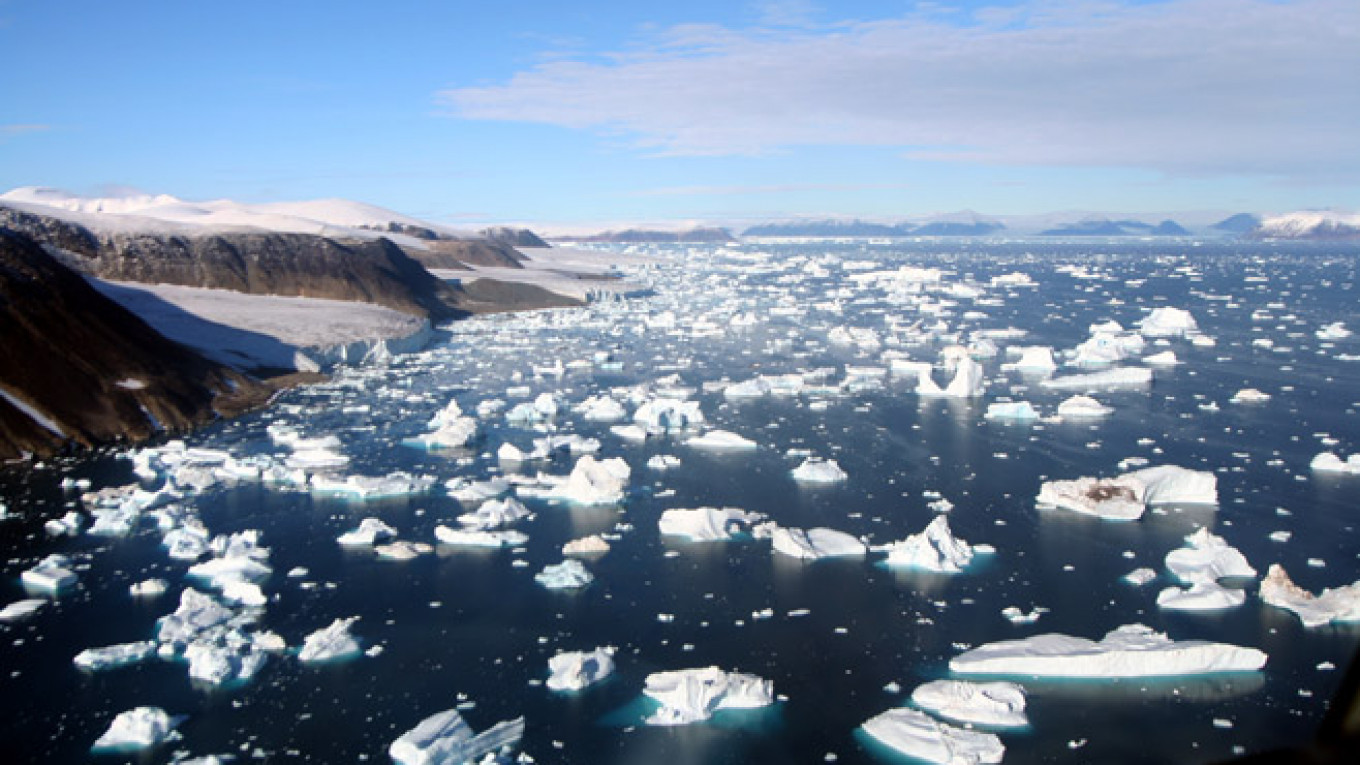While governors of Russia's Arctic regions agreed Thursday that the development of the Arctic would be the "next space program," there are increased fears that the recent plunge in oil prices could jeopardize these ambitious plans.
The governors of the Murmansk, Arkhangelsk and Chukotka regions, as well as of the head of the Yamal-Nenets autonomous district, Arctic experts and Duma deputies, were speaking at the Arctic session of the annual Gaidar forum in Moscow. The momentum Russia's Arctic policy has gained in recent years was reflected by the turnout for the event: The panel's hall was packed with journalists and experts, with dozens of people sitting and standing on the stairs.
In the last decade, Russia has started laying claims to the vast natural resources to be found in the Arctic Ocean, all the way from the Russian coast to the North Pole, while pushing to build massive military and logistic infrastructure on its territory above the Arctic circle.
Speaking at a Defense Ministry meeting last month, President Vladimir Putin asked military commanders to keep Russia's military expansion into the Arctic under "constant control."
"Let me say again that we have no intention of militarizing the Arctic. Our action in the Arctic is restrained and reasonable in scale and is simply in keeping with what Russia unquestionably needs to do to ensure its defense capability," he said at the time.
Governors of the Arctic regions stressed the region's economic potential at Thursday's discussion.
"The Arctic will for a long time be the driver of economic growth in Russia, it will be the next space program for the country," Dmitry Kobylkin, governor of the Yamal-Nenets autonomous district, told the audience at the forum, held at the Russian Presidential Academy of National Economy and Public Administration.
Kobylkin said that 85 percent of Russian gas and 12 percent of Russian oil is extracted in his region alone, which puts the territory among the top three Russian regions in terms of GDP per capita.
At the same time, the region's natural wealth also makes it especially vulnerable to changes in oil prices. Prices have dropped more than 50 percent from their peak of $115 per barrel in June last year.
Artur Chilingarov, an award-winning Russian Arctic explorer, voiced concern over what would happen to Arctic development plans given the new economic situation.
"I urge you to make this the main topic of your discussion: What will happen to the Russian Arctic in the new economic situation?" Chilingarov, who now serves as a special representative of Putin on international cooperation in the Arctic, asked the governors.
The governors did not have a ready answer, but hinted that in some Arctic regions, the situation is grim even without taking into consideration the looming economic crisis.
"In Soviet times, our population almost hit one million, now it stands at 770,000. Last year, 4,700 people left," said Marina Kovtun, governor of the Murmansk region.
Despite the exodus, Russia will try to increase its presence in the Arctic, according to Kovtun.
"The Arctic is mostly Russian, and Russia will claim more and more of its territory," she said.
Military Boost
By the end of this year, Russia will have 14 operational airfields in the Arctic, according to analysis compiled by IHS Jane's research group.
In addition, Russia is expected to deploy a number of Pantsir-S1 ground-based defense systems in the region, the analysis said.
Russia is one of five countries that border the Arctic Ocean and is the largest one by population. Russia has extensive territorial claims in the resource-abundant region, which has caused multiple tensions with the United States, Canada and Norway.
While Finance Minister Anton Siluanov said Wednesday at the Gaidar forum that the 2015 federal budget would be cut by more than 10 percent, defense expenditures will remain intact.
Russia's new military doctrine that was signed by Putin at the end of last month for the first time listed "maintaining Russia's national interests in the Arctic" among the main goals of its defense forces.
Russia and the West have cooperated on Arctic development with oil giants such as BP, Total, Shell, Statoil and ExxonMobil working on large-scale projects in the region. But the Ukraine conflict that has provoked the worst crisis in Russia-West relations since the Cold war has turned partners into adversaries, with Western countries canceling or significantly downsizing their Arctic projects in Russia.
Now even peaceful environmental joint exploration missions are in jeopardy. According to Terry Callaghan, professor of Arctic Ecology at the University of Sheffield and president of the Interact project that helps researchers from the European Union and Russia work at each other's 73 stations in the Arctic, the European Union stopped funding the Russian leg of the project in 2015.
"There is no money [for sending researchers to Russian stations]. The money for it has gone. Nobody says it is political, but we all know what it is," he told The Moscow Times in an interview Thursday.
Contact the author at [email protected]
A Message from The Moscow Times:
Dear readers,
We are facing unprecedented challenges. Russia's Prosecutor General's Office has designated The Moscow Times as an "undesirable" organization, criminalizing our work and putting our staff at risk of prosecution. This follows our earlier unjust labeling as a "foreign agent."
These actions are direct attempts to silence independent journalism in Russia. The authorities claim our work "discredits the decisions of the Russian leadership." We see things differently: we strive to provide accurate, unbiased reporting on Russia.
We, the journalists of The Moscow Times, refuse to be silenced. But to continue our work, we need your help.
Your support, no matter how small, makes a world of difference. If you can, please support us monthly starting from just $2. It's quick to set up, and every contribution makes a significant impact.
By supporting The Moscow Times, you're defending open, independent journalism in the face of repression. Thank you for standing with us.
Remind me later.


